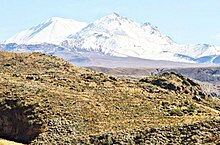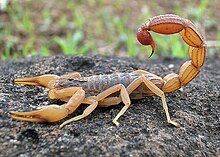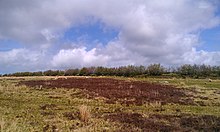Portal:Science
Science portal

Science is a systematic discipline that builds and organises knowledge in the form of testable hypotheses and predictions about the universe. Modern science is typically divided into two or three major branches: the natural sciences (e.g., physics, chemistry, and biology), which study the physical world; and the behavioural sciences (e.g., economics, psychology, and sociology), which study individuals and societies. The formal sciences (e.g., logic, mathematics, and theoretical computer science), which study formal systems governed by axioms and rules, are sometimes described as being sciences as well; however, they are often regarded as a separate field because they rely on deductive reasoning instead of the scientific method or empirical evidence as their main methodology. Applied sciences are disciplines that use scientific knowledge for practical purposes, such as engineering and medicine. (Full article...)
Featured article -
Featured pictures
Vital articles
Psychology is the scientific study of mind and behavior. Its subject matter includes the behavior of humans and nonhumans, both conscious and unconscious phenomena, and mental processes such as thoughts, feelings, and motives. Psychology is an academic discipline of immense scope, crossing the boundaries between the natural and social sciences. Biological psychologists seek an understanding of the emergent properties of brains, linking the discipline to neuroscience. As social scientists, psychologists aim to understand the behavior of individuals and groups. (Full article...)
Did you know...
- ... that the Data Colada bloggers drew attention to the replication crisis by exposing faulty social science research?
- ... that public health measures and advances in medical science in modern human history helped raise global life expectancy from about 31 years in 1900 to over 66 years in 2000?
- ... that Henry E. Sigerist felt "depressed" after reading A History of Science, Technology, and Philosophy in the 16th and 17th Centuries?
- ... that Mary Clutter used her directorial position at the National Science Foundation to require scientific conferences to include women speakers when presenting research done by them?
- ... that the 1827 novel A Voyage to the Moon contains the first use of anti-gravity for space travel in science fiction?
- ... that Australian Madeleine Steere played water polo professionally in Turkey after studying biomolecular science in the United States?
Get involved
| This portal needs to be updated. Please help update this portal to reflect recent events or newly available information. Relevant discussion may be found on the talk page. |

|

|
Science News
- 16 January 2025 – 2025 in spaceflight
- Blue Origin launches its New Glenn rocket for the first time from Cape Canaveral Space Force Station in Florida, United States. The rocket's second stage, carrying a prototype Blue Ring spacecraft, successfully reaches a geocentric orbit, but its reusable first stage is lost during landing. (CNN)
- The twin satellites SDX01 and SDX02 of the SpaDeX mission, launched in December by the Indian Space Research Organisation, successfully conduct India's first spacecraft docking, with India becoming the fourth country to successfully dock a spacecraft after the United States, Russia, and China. (BBC News)
- SpaceX launches its seventh test flight of the Starship launch vehicle, with an improved second stage, at Starbase in Texas, United States. The first stage is successfully caught by the launch tower but the second stage breaks up shortly before engine shutdown. (CNBC)
- 2 January 2025 – 2025 in paleontology, Dinosaur finds in the United Kingdom
- The largest site of dinosaur footprints of the Cetiosaurus and Megalosaurus dating back to the Middle Jurassic Bathonian stage 166 million years ago is discovered at a quarry in Oxfordshire, England, United Kingdom. (BBC News)
- 25 December 2024 – 2024 in archosaur paleontology
- Scientists confirm the discovery of the Alpkarakush kyrgyzicus dinosaur species in Kyrgyzstan, the first theropod from the Jurassic period to be discovered in Central Asia. (Tempo)
- 23 December 2024 –
- A team of scientists at the North-Eastern Federal University in Sakha Republic, Russia, unveil the highly preserved remains of a 50,000-year-old female juvenile woolly mammoth named Yana. The researchers say Yana was roughly about one-year-old when she died, likely from drowning, and was discovered in the Batagaika crater by locals. (BBC News)
Related portals
Top 10 WikiProject Science Popular articles of the month -
Categories -


































































